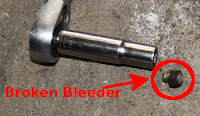When replacing the brakes, many (let say most?) home mechanics overlook doing the same for the brake fluid. Brake fluid works hard and needs to be replaced with fresh fluid in order to get the best stopping performance. Over
time, brake fluid absorbs water from the atmosphere and becomes less effective
-- the contaminated fluid can be compressed more easily this diminishing the
efficacy of the brakes. The extra moisture in the system will also
cause problems for the braking lines, causing them to rust from the
inside out. All not good! I inspected the brake lines on my Freestyle, but if the deterioration is happening on the inside, there's not much to see from the outside until the leaking starts.
Brake fluid costs about $8 for a large
bottle, so why not replace that well? I'll tell you why: bleeding
brakes is a bit of a pain and messy and there's the fear that it will be
done completely wrong causing massive brake failure at an unpredictable
time resulting in the car careening off the road, hitting an
embankment and erupting into a giant fireball. Or maybe it's just
messy?
Out with the old
 |
| Looks like it was never changed |
Several specialized tools exist for extracting the used brake fluid from the master cylinder, the one shown in the picture happens to be a turkey baster from the dollar store. Not the greatest tool, but cheap and disposable. The fluid is... groady. New brake fluid looks as translucent as light veggie oil. What I see here looks like over-worked oil I've drained from vats while working as a teen-ager in fast food. Ewwww. The picture just doesn't convey the abhorrent condition of the liquid, it's both brown and green with what looks like algae floating about -- give it another three months and we might have a new life form on our hands.
In with the new
 |
| HF suction brake bleeder |
The replacement procedure is easy. You'll need a way to catch the old fluid, I happen to have a HF special vacuum pump operating by my small (but powerful!) compressor. Even though the vacuum draws the fluid, I still speed the process by having somebody push the brakes while using suction.
Start from wheel the furthest from the brake fluid reservoir, remove the dust jacket from the bleeder, give the bleeder a turn with a socket or wrench (11mm in my case) and some of the liquid will just start dripping out, attach the bleeder hose and have a buddy pump the brakes. When the fluid's clean, tighten the bleeder; just to make sure that I don't let air seep back in, tighten the bleeder while the vacuum is running; you can get the same effect by tightening the bleeder when your buddy is pushing in on the brake peddle.
 |
| Catching brake fluid |
For this car, when the rear caliper was detached from the car when doing the brakes, I took the liberty of letting the fluid drain from the brake hose into a spare oil bottle. I still had to do the bleeding process, as the re-attached caliper contained both air and some old fluid, but since most of the old fluid drained out of the lines, the new fluid was visible in just a push or two of the brakes.
All that's left to do replace the dust cover, top-up the brake fluid and move to the next wheel in the rear. Repeat again on the front wheel farthest from the master cylinder and then the remaining wheel. Removing the wheels and lifting the car is the hardest part of the job. I have the habit of lifting just one wheel at a time when I can, because that is the safest approach, keeping as many wheels in contact with the ground as possible.
Broken Bleeder
 |
| Decapitated bleeder |
 |
| Bleeder screw that broke |
Consider using some penetrating oil on the bleeders so they turn without incident. Sometimes, the bleeders can break off, as they're essentially a hollow bolt. This happened on the front driver's caliper. Having some other chores to do, I left well enough alone, when I get the chance, I'll pull out this bleeder and replace it, but that's another project and post.
Disposal
Brake fluid is not motor oil, so don't secretly dump it in the used oil vat of your local reclamation center. Please bring it to your area's hazardous waste collection center for proper disposal. We all
live here, so do the right thing.






No comments:
Post a Comment